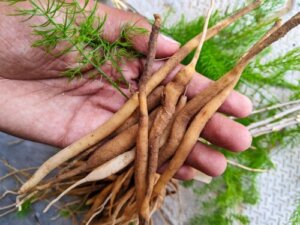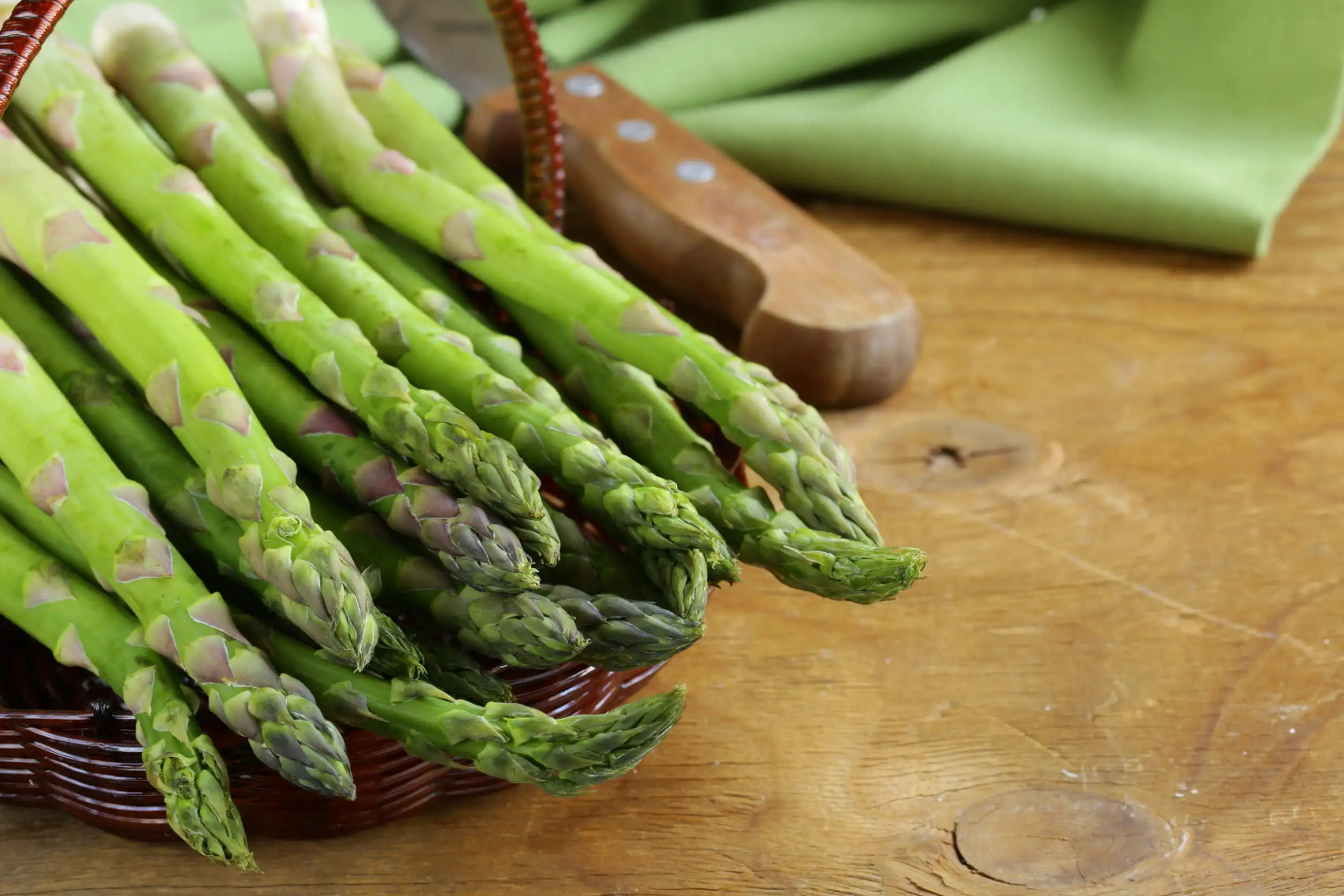Shatavari: The Ayurvedic Plant for Women's Health


Reviewed and approved by the pharmacist Franciele Rohor de Souza
Shatavari, with the scientific name Asparagus racemosus, is a plant that belongs to the same family as the common asparagus. In fact, it is also known as “wild asparagus” or “Indian asparagus”. It usually grows in the soils of India, Sri Lanka, and parts of Australia.
It’s a root used in Ayurvedic medicine to treat infertility problems, and it’s said to be a great help for women and helps with their hormonal and reproductive health. What does science think about it? Find out!
Shatavari: active principles and medicinal properties
Shatavari is a climbing shrub that can reach 2 meters (6.6 feet) in height. In countries such as India, it’s quite popular due to its applications in Ayurvedic medicine, especially for its uses related to reproductive health.
According to a review shared in the Asian Pacific Journal of Tropical Disease, this is largely due to its high content of phytoconstituents. In particular, more than 50 active principles have been identified, including the following:
- Isoflavones
- Immunoside (glycoside)
- Essential fatty acids
- Vitamins A, B1, B2, C, and E
- Polycyclic alkaloid (aspargamine A)
- Carbohydrates, polysaccharides and mucilages
- Flavonoids (kaempferol, quercetin and rutin)
- Steroidal saponins, also known as shatvarins
- Trace minerals, such as zinc, manganese, copper, cobalt, calcium, magnesium, potassium and selenium
Of course, due to its composition, it isn’t surprising that the shrub is associated with a number of pharmacological properties. According to the same publication, it has galactagogue activity (which stimulates the production of breast milk), anti-ulcer potential, and adaptogenic effects.
It also has antioxidant, anti-inflammatory, antimicrobial, immunomodulatory and antidepressant abilities. As far as women’s health is concerned, it’s linked to increased libido, fertility, hormonal balance, and protection of the sexual organs. This time, we focus on just these effects.
You may be interested in: 5 Herbs that May Help Boost Libido
What are the benefits of shatavari for women’s health?
It’s common to define shatavari and its supplements as “women’s tonics”. This is, in large part, because of the effects derived from its isoflavones, which act as phytoestrogens.
What does this mean? These plant substances are similar to human estrogens, hormones involved in many different processes in women’s health.
Although their effect is weaker, they act as regulators and can help both in cases of deficiency as well as in cases of lack of control due to excess of these hormones. Let’s see under what conditions it can be useful and what science says about it.
Premenstrual syndrome
For many years, shatavari-based remedies have been adjuvants against the symptoms of premenstrual syndrome. Isoflavones, flavonoids, and saponin glycoside may be behind these effects.
In a study shared by the National Center for Biotechnology Information it was reported that a medicinal composition containing 85 parts of Asparagus racemosus and 5 parts of Withania sominifera, Pedalium murex and Tinospora cordifolia showed usefulness against adverse symptoms of PMS in women.
To achieve this effect, the researchers suggest ingesting two capsules of the supplement, three times a day. Each capsule has half a gram of the composition. However, these effects are still under study.

Hormonal balance
Linked to the previous effect, it’s worth noting that shatavari supplements are useful to promote hormonal balance in women. They don’t only decrease the risk of premenstrual symptoms, but also irregular periods and polycystic ovary syndrome.
A review shared through Biomedicine and Pharmacotherapy reveals that shatavari helps reduce oxidative stress and increases antioxidant capacity in the body. It improves problems associated with hormonal imbalance, polycystic ovary syndrome (PCOS), follicular growth and development, and infertility.
It should be borne in mind that most studies have been carried out in laboratory and animal settings. Therefore, more extensive testing is needed to corroborate such effects in women and to evaluate the mechanism of action.
Breastfeeding
One of the traditional uses of shatavari has to do with the stimulation of breast milk production. In fact, its galactagogue properties have been evaluated in some clinical studies.
A randomized controlled trial shared in the Iranian Journal of Pharmaceutical Research reported that supplementation with Asparagus racemosus helped increase prolactin levels, a key hormone for lactation.
A review of studies found that Asparagus racemosus supplements help increase breast milk volume, but their use doesn’t replace other modifiable factors involved in milk production.
Menopause
Shatavari supplementation is linked to a decrease in nighttime hot flashes, sweating, depression and other menopausal symptoms. A supplement of Asparagus racemosus – combined with other plants, such as Tinospora cardifolia, Withania somnifera, and Commiphora mukul – was reported through the Journal of Herbal Medicine to help decrease menopausal symptoms after 12 weeks of use.
In particular, participants taking the supplement reported a significant decrease in daytime hot flashes and night sweats. In addition, a study in the journal Nutrients associated this herbal supplement with improved musculoskeletal function in postmenopausal women.
Fertility and libido
In terms of sexual and reproductive health, shatavari is linked to increased sexual desire and fertility. A publication in Pharmacognosy shows that the plant is useful against female reproductive system problems.
To be more precise, its use is related to decreased infertility, an increase in libido, reduced inflammation of the sexual organs, and the preparation of the uterus for conception. These applications are often supported by anecdotal evidence.
More specific and extensive studies are suggested to corroborate such effects.
Risks and contraindications of shatavari
Shatavari consumption is generally safe for most healthy women. However, it’s advisable to consult a doctor before taking this type of supplement.
Excessive consumption can lead to digestive discomfort, such as abdominal bloating, nausea, and pain. Therefore, it’s advisable to respect the dosage suggested by the manufacturer.
Likewise, the following contraindications must be taken into account:
- High-risk pregnancy (consult your doctor)
- Renal and urinary tract diseases
- History of allergy to asparagus
- Sensitivity to estrogens
- Heart disease

Read more here: 8 Amazing Health Benefits of Asparagus
Formats and how to consume shatavari
In herbalist stores, it’s possible to find shatavari supplements in powder and capsule presentations. In general, a dose of 6 grams per day is recommended. In nursing mothers the dose varies from 3 to 6 grams per day, depending on body weight (60 mg powder/kg body weight).
The product is usually taken with or after meals. It isn’t recommended on an empty stomach.
The powder can be diluted in cow’s milk or vegetable milks. It can also be prepared in water.
The period of consumption can be extended up to 3 months. This can be determined with the physician.
What to remember about this tonic for women?
In Ayurvedic medicine, shatavari is an ideal supplement for several stages of a woman’s life. Due to its antioxidant and phytoestrogen content, it’s considered an ally against disorders resulting from hormonal fluctuations.
However, like other herbal supplements, its use should be prudent and supervised by a physician. Although some studies support its properties, it isn’t considered a first-choice treatment.
Its consumption doesn’t replace the benefits of a healthy lifestyle and other medical treatments.
All cited sources were thoroughly reviewed by our team to ensure their quality, reliability, currency, and validity. The bibliography of this article was considered reliable and of academic or scientific accuracy.
- Alok S, Jain SK, Verma A, Kumar M, Mahor A, Sabharwal M. Plant profile, phytochemistry and pharmacology of Asparagus racemosus (Shatavari): A review. Asian Pac J Trop Dis. 2013 Jun;3(3):242–51. doi: 10.1016/S2222-1808(13)60049-3. PMCID: PMC4027291.
- Negi JS, Singh P, Joshi GP, Rawat MS, Bisht VK. Chemical constituents of Asparagus. Pharmacogn Rev. 2010 Jul;4(8):215-20. doi: 10.4103/0973-7847.70921. PMID: 22228964; PMCID: PMC3249924.
- National Center for Biotechnology Information (2022). PubChem Patent Summary for US-6589569-B1. Retrieved November 8, 2022 from https://pubchem.ncbi.nlm.nih.gov/patent/US-6589569-B1.
- Pandey AK, Gupta A, Tiwari M, Prasad S, Pandey AN, Yadav PK, Sharma A, Sahu K, Asrafuzzaman S, Vengayil DT, Shrivastav TG, Chaube SK. Impact of stress on female reproductive health disorders: Possible beneficial effects of shatavari (Asparagus racemosus). Biomed Pharmacother. 2018 Jul;103:46-49. doi: 10.1016/j.biopha.2018.04.003. Epub 2018 Apr 7. PMID: 29635127.
- Gupta M, Shaw B. A Double-Blind Randomized Clinical Trial for Evaluation of Galactogogue Activity of Asparagus racemosus Willd. Iran J Pharm Res. 2011 Winter;10(1):167-72. PMID: 24363697; PMCID: PMC3869575.
- Drugs and Lactation Database (LactMed) [Internet]. Bethesda (MD): National Library of Medicine (US); 2006-. Wild Asparagus. [Updated 2022 Sep 19]. Available from: https://www.ncbi.nlm.nih.gov/books/NBK501813/
- Steels, E., Steele, M., Harold, M., Adams, L., & Coulson, S. (2018). A double-blind, randomized, placebo-controlled trial evaluating safety and efficacy of an ayurvedic botanical formulation in reducing menopausal symptoms in otherwise healthy women. In Journal of Herbal Medicine (Vol. 11, pp. 30–35). Elsevier BV. https://doi.org/10.1016/j.hermed.2018.01.001
-
O’Leary MF, Jackman SR, Sabou VR, Campbell MI, Tang JCY, Dutton J, Bowtell JL. Shatavari Supplementation in Postmenopausal Women Improves Handgrip Strength and Increases Vastus lateralis Myosin Regulatory Light Chain Phosphorylation but Does Not Alter Markers of Bone Turnover. Nutrients. 2021 Nov 27;13(12):4282. doi: 10.3390/nu13124282. PMID: 34959836; PMCID: PMC8708006.
- Sharma, Komal & Bhatnagar, Maheep. (2011). Asparagus racemosus (Shatavari): A Versatile Female Tonic. International Journal of Pharmaceutical & Biological Archives. 2. 855-863.
This text is provided for informational purposes only and does not replace consultation with a professional. If in doubt, consult your specialist.








